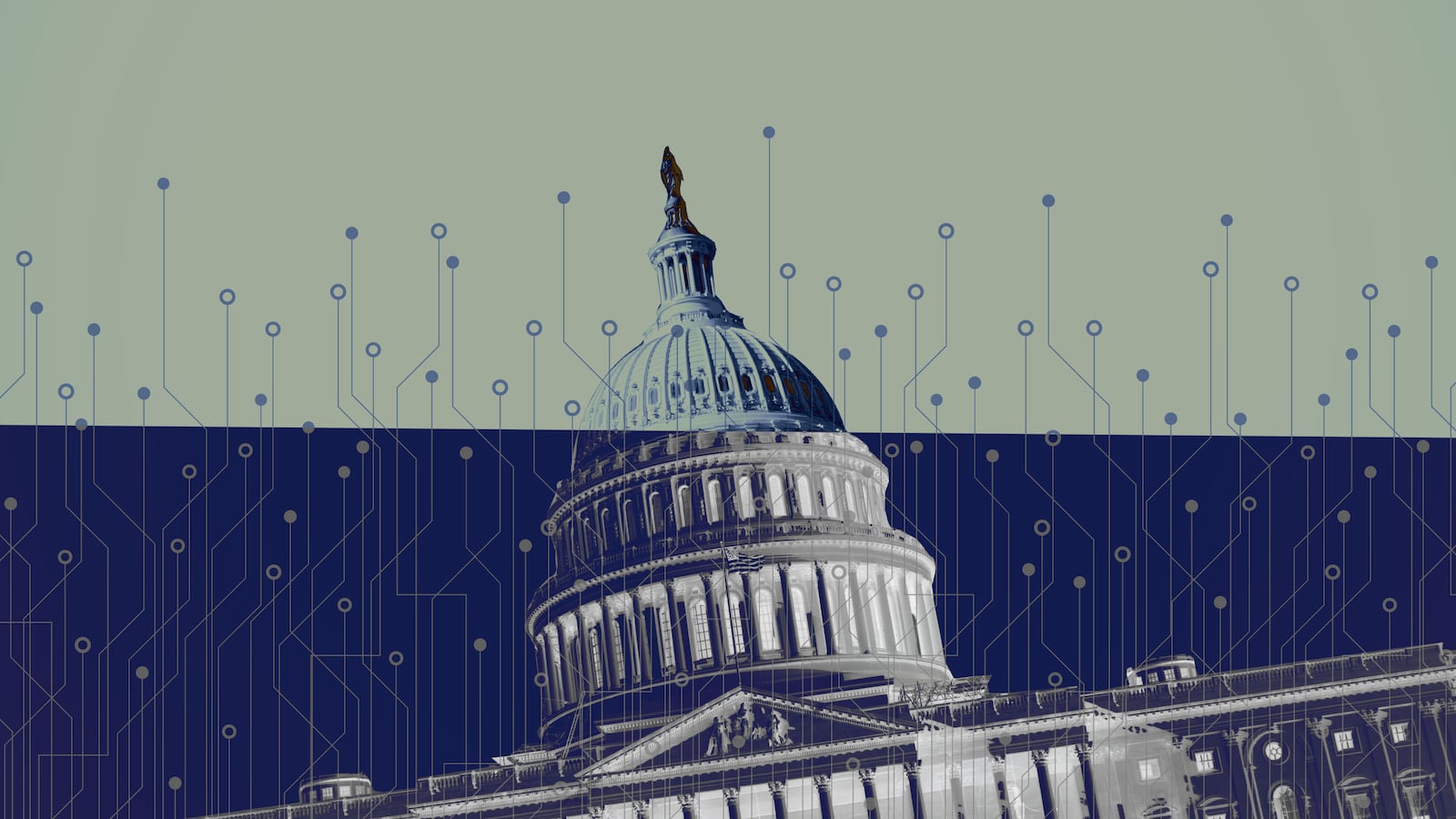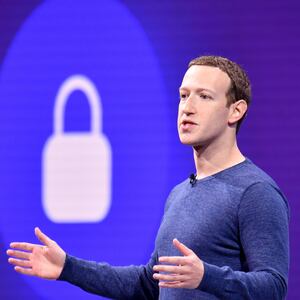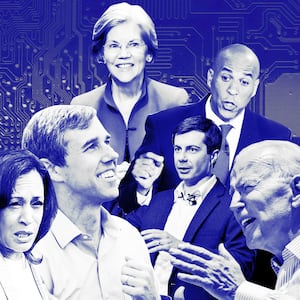Silicon Valley's best and brightest will be busy this week in a trio of tech-centric hearings on Capitol Hill. The goal for these reps personifying the biggest of Big Tech: Act as tiny as possible.
Tech's best possible outcome is one in which its representatives in Congress trot off the Hill looking lightly chastened and deferential, congressional egos adequately inflated. In front of lawmakers, the game plan for these companies is to act small—even as they pursue their respective manifest destinies, reshaping the world at any cost.
The main events will be a pair of hearings examining Facebook's new digital currency, Libra. The company’s cryptocurrency lead David Marcus will argue that its new cryptocurrency —a "giant leap forward"—poses not only no threat to existing financial institutions (why launch it then?) but that the project is barely Facebook's at all. Instead, the company has cobbled together something it calls the Libra Association, a group of blockchain and financial entities forming a "wholly independent organization."
Never mind that Calibra's first project will be a digital wallet for Facebook Messenger and Facebook-owned WhatsApp inviting business owners on the company's platform to transact with its 2.3 billion users. "That increased usage is likely to yield greater advertising revenue for Facebook," Marcus notes.
Beyond concerns over Facebook blazing a path into some only lightly charted cryptocurrency territory, lawmakers are worried about where the company came from, given its fairly extensive history of deprioritizing user privacy in favor of aggressive growth. (Mark Zuckerberg’s alternating cooperative and condescending comments about regulating Facebook’s veritable nation of data probably aren’t helping.)
Facebook will have the most time in the hot seat by far, but Google and Amazon also have their work cut out for them. Reps from the three companies—as well as Apple—will face down one of their fiercest critics in Congress on Tuesday as three of the five most valuable companies in the world walk a tightrope, masquerading as regular businesses instead of sprawling, data-gobbling empires unlike anything history has ever known. While Facebook, Google, and Amazon make their respective cases, Apple will grapple with its own antitrust demons as the company tries to differentiate its business model from that of its more data-centric, privacy-careless peers.
Congress and Cryptocurrency
Across two hearings, lawmakers will grill Facebook’s Marcus, CEO of the company’s new cryptocurrency subsidiary Calibra. That’s the subsidiary Facebook created to develop a digital wallet and other financial services for its currency, Libra.
Marcus will appear before the Senate Banking Committee at 10 a.m. ET on Tuesday (livestream available here). In the past, that committee, chaired by Mike Crapo (R-ID), has pressed Facebook on the company’s privacy practices and how third parties might leverage financial data on its users, two themes likely to emerge in its questioning Tuesday.
At Facebook, Marcus is now synonymous with the company’s cryptocurrency aspirations, but it wasn’t always that way. The executive is better known for his four years spent as Facebook’s VP of Messaging, a key piece of the company’s aggressive social media empire.
In mid-2018, Facebook announced that Marcus would leave his post to explore blockchain applications for the company and Libra is the project that grew out of his time doing so. The former president of PayPal, Marcus joined Coinbase’s board in 2017, a move that suggested Facebook was interested in leveraging its unrivaled social graph for in-app payments.
He only served on the board for nine months, but his blend of experience in payments, messaging, and the broader cryptocurrency world made him well-suited to dream up a vision in which Facebook reimagines itself as a digital payment platform.
Maxine Waters vs. Facebook
Congress isn’t likely to warm to Facebook’s ambitions. Case in point: The House Financial Services Committee is working on a draft of a bill called the “Keep Big Tech Out of Finance Act.” The act is targeting Libra in no uncertain terms and plans to block “the establishment of an alternative financial currency controlled by large, private, for-profit companies with little government oversight.”
On Wednesday at 10 a.m., the House's Committee on Financial Services will host Marcus for Facebook's second hearing in two days (livestream available here). This round will examine the impact of Facebook’s digital currency project on “consumers, investors, and the American financial system.”
The committee is chaired by California Rep. Maxine Waters, who issued the call for Libra to come under congressional scrutiny when the project was first announced and later called for a moratorium on the project’s development.
The Facebook executive’s written testimony for the first hearing, available now, rehashes most of the company’s major talking points around privacy and the Facebook-created Libra Association, an oversight body for the project.
While Marcus is likely to hew to his media training and recycle the previous day’s talking points, he’s likely to encounter more open hostility in the House hearing, which could lead to some rare unguarded moments for famously slippery company.
Big Tech’s Antitrust Nightmare
Beyond a duo of cryptocurrency hearings, Facebook has a third date with Congress. On Tuesday at 2 p.m., Facebook’s head of global policy Matt Perault will appear with representatives from Amazon, Google, and Apple in a hearing with the House Judiciary’s antitrust subcommittee. Google Director of Economic Policy Adam Cohen will represent the search giant, Apple is sending Kyle Andeer, VP of corporate law, and Amazon will send Associate General Counsel Nate Sutton.
Tuesday’s event is the antitrust subcommittee’s second look into Big Tech’s bad behavior, with this round focused on how those companies might be stifling innovation. The first hearing, held on June 11, examined how big internet platforms are impacting the media landscape. The subcommittee’s chairman David Cicilline (D-RI) is a fierce tech critic known for issuing ominous threats in Silicon Valley’s direction.
“American antitrust agencies have not pursued a significant monopoly case in more than two decades, even as corporate concentration and monopoly power have reached historic levels,” Cicilline wrote in an op-ed earlier this year.
The tech industry is on edge waiting to see if Congress will back its bark with bite, but those tensions rarely boil over in hearings like these. Tech’s c-suite execs are generally a bit likelier to veer off the rails than the folks who massage a company’s message full-time—they’re in charge, after all—but even top dogs usually stick to the script.
Between its disciplined policy leads and teflon legal eagles, the clash between Cicilline’s committee and tech’s most powerful players isn’t likely to produce fireworks. But with this corner of Congress plotting an exhaustive "top-to-bottom" antitrust examination of the tech industry, lawmakers might just be getting started.
“These are huge monopolies and we want to make sure we’re doing everything we can to make markets work,” Cicilline said last month. “We’re in this very serious monopoly moment.”








